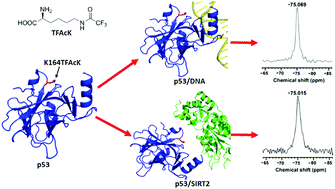A genetically encoded 19F NMR probe for lysine acetylation†
Abstract
Advances in acetylated protein–protein/DNA interactions depend on the development of a novel NMR (nuclear magnetic resonance) probe to study the conformational changes of acetylated proteins. However, the method for detecting the acetylated protein conformation is underdeveloped. Herein, an acetyllysine mimic has been exploited for detecting the conformational changes of acetylated p53–protein/DNA interactions by genetic code expansion and 19F NMR. This 19F NMR probe shows high structural similarity to acetyllysine and could not be deacetylated by sirtuin deacetylase in vitro/vivo. Moreover, acetylation of p53 K164 is reported to be deacetylated by SIRT2 for the first time.



 Please wait while we load your content...
Please wait while we load your content...